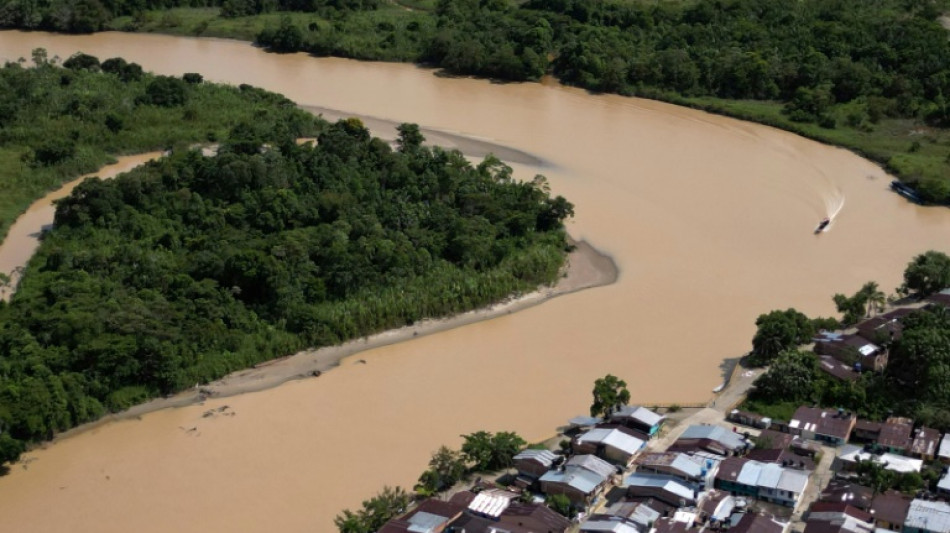
-
 Naib's fifty lifts Afghanistan to 182-6 against New Zealand
Naib's fifty lifts Afghanistan to 182-6 against New Zealand
-
Paul Thomas Anderson wins top director prize for 'One Battle After Another'

-
 De Beers sale drags in diamond doldrums
De Beers sale drags in diamond doldrums
-
NFL embraces fashion as league seeks new audiences

-
 What's at stake for Indian agriculture in Trump's trade deal?
What's at stake for Indian agriculture in Trump's trade deal?
-
Real Madrid can wait - Siraj's dream night after late T20 call-up

-
 Castle's monster night fuels Spurs, Rockets rally to beat Thunder
Castle's monster night fuels Spurs, Rockets rally to beat Thunder
-
Japan votes in snow-hit snap polls as Takaichi eyes strong mandate

-
 Pakistan's capital picks concrete over trees, angering residents
Pakistan's capital picks concrete over trees, angering residents
-
Berlin's crumbling 'Russian houses' trapped in bureaucratic limbo

-
 Neglected killer: kala-azar disease surges in Kenya
Neglected killer: kala-azar disease surges in Kenya
-
Super Bowl set for Patriots-Seahawks showdown as politics swirl

-
 Sengun shines as Rockets rally to beat NBA champion Thunder
Sengun shines as Rockets rally to beat NBA champion Thunder
-
Matsuyama grabs PGA Phoenix Open lead with Hisatsune one back

-
 Washington Post CEO out after sweeping job cuts
Washington Post CEO out after sweeping job cuts
-
Haiti's transitional council hands power to PM

-
 N. Korea to hold party congress in February, first since 2021
N. Korea to hold party congress in February, first since 2021
-
Thailand votes after three leaders in two years

-
 Swiss joy as Von Allmen wins first gold of Winter Olympics
Swiss joy as Von Allmen wins first gold of Winter Olympics
-
George backs England to 'kick on' after Six Nations rout of Wales

-
 Malinin upstaged as Japan keep pressure on USA in skating team event
Malinin upstaged as Japan keep pressure on USA in skating team event
-
Japan's Kimura soars to Olympic gold in snowboard big air final

-
 Vail's golden comets Vonn and Shiffrin inspire those who follow
Vail's golden comets Vonn and Shiffrin inspire those who follow
-
Veteran French politician loses culture post over Epstein links

-
 Japan's Kimura wins Olympic snowboard big air gold
Japan's Kimura wins Olympic snowboard big air gold
-
Arteta backs confident Gyokeres to hit 'highest level'

-
 Hojlund the hero as Napoli snatch late win at Genoa
Hojlund the hero as Napoli snatch late win at Genoa
-
England's Arundell 'frustrated' despite hat-trick in Wales romp

-
 Lollobrigida skates to first Italian gold of Winter Olympics on her birthday
Lollobrigida skates to first Italian gold of Winter Olympics on her birthday
-
Arundell hat-trick inspires England thrashing of Wales in Six Nations opener

-
 Chile's climate summit chief to lead plastic pollution treaty talks
Chile's climate summit chief to lead plastic pollution treaty talks
-
Rosenior hails 'unstoppable' Palmer after treble tames Wolves

-
 French ex-minister offers resignation from Paris cultural hub over Epstein links
French ex-minister offers resignation from Paris cultural hub over Epstein links
-
New NBA dunk contest champ assured and shooting stars return

-
 Shiffrin says will use lessons learnt from Beijing flop at 2026 Games
Shiffrin says will use lessons learnt from Beijing flop at 2026 Games
-
Takaichi tipped for big win as Japan votes

-
 Lens return top of Ligue 1 with win over Rennes
Lens return top of Ligue 1 with win over Rennes
-
Shiffrin learning from Beijing lessons ahead of Milan-Cortina bow

-
 Demonstrators in Berlin call for fall of Iran's Islamic republic
Demonstrators in Berlin call for fall of Iran's Islamic republic
-
'Free the mountains!": clashes at Milan protest over Winter Olympics

-
 Townsend accepts pressure will mount on him after Italy defeat
Townsend accepts pressure will mount on him after Italy defeat
-
BMW iX3 new style and design

-
 Suryakumar's 84 leads India to opening win over USA in T20 World Cup
Suryakumar's 84 leads India to opening win over USA in T20 World Cup
-
Lollobrigida skates to first Italian gold of Milan-Cortina Games

-
 Barca beat Mallorca to extend Liga lead
Barca beat Mallorca to extend Liga lead
-
Gyokeres lifts Arsenal nine clear as Man Utd pile pressure on Frank

-
 Late Guirassy winner for Dortmund trims Bayern's lead atop Bundesliga
Late Guirassy winner for Dortmund trims Bayern's lead atop Bundesliga
-
'Free the mountains!": protest in Milan over Winter Olympics

-
 Gyokeres double helps Arsenal stretch Premier League lead
Gyokeres double helps Arsenal stretch Premier League lead
-
New Skoda Epiq: modern with range


In Colombia, a river's 'rights' swept away by mining and conflict
In 2016, a Colombian court sent a powerful statement on environmental protection by ruling that a crucial river in the northwestern Choco jungle, which was being decimated by illegal mining, had legal rights.
The landmark decision, which came the same year the government inked an historic peace deal with the FARC guerrillas who controlled much of Choco, compelled the state to protect the Atrato river, the lifeblood of the region.
A new dawn seemed possible in Colombia's poorest, conflict-scarred department, where dozens of children had died from mercury poisoning due to illegal gold mining in the river.
But eight years later, the Atrato is still dotted with illegal dredging barges that churn up the riverbed in search of gold. New armed groups have filled the void left by FARC fighters. Locals still fear health risks from the river's turbid waters.
As Colombia prepares to host the COP16 UN summit on biodiversity in Cali from October 21 to November 1, the plight of the Atrato underscores the challenges facing conservationists in conflict-ridden areas.
The Atrato snakes 750 kilometers (460 miles) across Choco, from the Andes and through thick jungle to the Caribbean Sea.
In the near absence of paved roads in the region, the river and its tributaries are the main conduits for the transport of people and goods, as well as being a vital source of food.
"It is like an arterial vein... without it we would not exist," Claudia Rondan, a 41-year-old environmental activist from the Embera Indigenous community, told AFP.
- River is 'sick' -
Rondan is one of 14 leaders from riverside communities who act as "guardians" of the Atrato, helping to ensure compliance with the 2016 court ruling.
But she feels powerless to revive a waterway she describes as "sick".
Ramon Cartagena, a 59-year-old environmentalist and guardian near the river's source in El Carmen de Atrato, is equally despairing.
"There is no life at all in the river," he said.
"Our parents left us ... a translucent, clear river, and today we have an obligation to do the same and I think we are failing."
The Atrato starts at 3,900 meters (12,800 feet) above sea level in the Western Cordillera, the lowest branch of the Colombian Andes.
At source the water is crystal clear and fit for drinking.
But by the time it widens out near Choco's main city of Quibdo, its fast-flowing, murky waters are laced with mercury, a key ingredient in gold mining that has been blamed for the deaths of dozens of children in the past decade.
Colombia is the country worst affected worldwide by mercury pollution, a UN report found in 2018.
In Quibdo, fishmongers complain they can't find buyers for their catch, because residents fear being poisoned.
Arnold Rincon, director of the local environmental authority, insists that the river's mercury levels are safe.
But Jose Marrugo, an expert in mercury pollution at the University of Cordoba, in northern Colombia, said some villagers show signs of "chronic poisoning."
- Look the other way -
So far in 2024, the military has destroyed 334 illegal mining machines in the Atrato river.
But the dredging continues regardless.
On a recent visit to the region, AFP saw several ramshackle mining rafts on the river.
"People are afraid to report it, everyone remains silent," said Bernardino Mosquera, another of Atrato's guardians told AFP.
That includes the river's custodians. They say they have received death threats for combating illegal mining.
Colombia is the most dangerous country in the world for environmental activists, with 79 land and environmental activists killed in 2023 alone, according to a report published earlier this month by Global Witness, a watchdog.
The judge who endowed the Atrato with basic rights, Jorge Ivan Palacio, has blamed "a lack of political will" and corruption for the state's failure to properly implement the ruling.
In a damning indictment, Colombia's Ombudsman's Office, which oversees the protection of civil and human rights, said there was "no evidence of any kind of progress towards effective conservation" in the region since 2016.
X.AbuJaber--SF-PST




